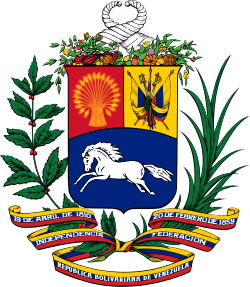Health care in Venezuela
Extensive inoculation programs and the availability of low- or no-cost health care provided by the Venezuelan Institute of Social Security have made Venezuela's health care infrastructure one of the more advanced in Latin America. Once the most comprehensive and well funded in the region, the health care system deteriorated sharply since the 1980s. Government expenditures on health care constituted an estimated 4.1 percent of gross domestic product in 2002. Total health expenditures per capita in 2001 totaled US$386. Per capita government expenditures on health in 2001 totaled US$240.
History
In a 1992-3 cholera epidemic in the Orinoco Delta, Venezuela's political leaders were accused of racial profiling of their own indigenous people to deflect blame from the country's institutions, thereby aggravating the epidemic.
State and private
Private hospitals and clinics and the qualifications of their medical personnel are comparable to U.S. standards. Private health services are costly and "full to bursting." The Government has accused private hospitals of profiteering. 2,000 doctors have left the country in 2006-'08 period.[1] However, overall life expectancy, as of 2009, is 74 compared to Brazil's 72[2] where roughly 1 in 5 have private health insurance.
Statistics
1990s
During the 1995–99 period, the mortality rate was 162.3 per 100,000 population for diseases of the circulatory system, 63.8 for malignant neoplasms, 55.3 for external causes, 53.6 for communicable diseases, and 22.4 for certain conditions originating before birth.
2000s
Several transmissible diseases, including dengue fever, malaria, measles, and tuberculosis, have reappeared in recent years. In 1999 an estimated 62,000 Venezuelans were living with acquired immune deficiency syndrome (AIDS); and in 2001 an estimated 2,000 people died from AIDS. At the end of 2003, the percentage of the population between the ages of 15 to 49 with human immunodeficiency virus (HIV)/AIDS was 0.7. In 2000, 85 percent of the urban population and 70 percent of the rural population had access to improved water. Improved sanitation was available to 71 percent of the urban population and 48 percent of the rural population. In August 2001, President Hugo Chávez announced a national campaign to fight the dengue fever epidemic that had infected 24,000 and killed four. Child immunization for measles in 2002 (as a percentage of under 12 months) was 78 percent, as compared with 84 percent in 1999.
2010s
In September 2014, Health Minister Nancy Pérez admitted that there were 45,745 cases of dengue fever.[3] There were also contested estimates involving the number of Venezuelans infected with Chikungunya. In September 2014, the Venezuelan government stated that only 400 Venezuelans were infected with Chikungunya[3] while the Central University of Venezuela stated that there could be between 65,000 and 117,000 Venezuelans infected.[4] The following month, President Maduro announced a plan to create the University of Science and Health and called for a meeting of ALBA in order to discuss the combat against the Ebola virus disease.[5]
Health conflicts
2014 Economic crisis
In 2014 when Venezuela's economy was facing difficulties, Venezuela's medical atmosphere deteriorated. As of August 2014, Venezuela is the only country in Latin America where the incidence of malaria is increasing, allegedly due to illegal mining and in 2013, Venezuela registered the highest number of cases of malaria in the past 50 years, with 300 of 100,000 Venezuelans being infected with the disease. Medical shortages in the country also hampered the treatment of Venezuelans.[6] Shortages of antiretroviral medicines to treat HIV/AIDS affected about 50,000 Venezuelans, potentially causing thousands of Venezuelans with HIV to develop AIDS.[7] Venezuelans also stated that due to shortages of medicines, it was hard to find acetaminophen to help alleviate the newly introduced Chikungunya virus.[8]
When 8 citizens of Aragua state died of an unknown illness in quick succession, the president of the College of Doctors in Aragua state, Angel Sarmiento, reported that it could have been from an unknown bacteria or virus. After this was reported, President Maduro called Sarmiento "a fascist", demanded his arrest saying he conducted "psychological terrorism" and said he would face severe consequences when he was captured. Luis López, head of public health in Aragua state, stated that the illness was not caused by Chikungunya.[8][3] President Maduro took the matters further by asking the World Health Organization to check if biological warfare was being conducted against Venezuela.[3] Later analysis at nongovernmental labs at the Central University of Caracas determined that the deaths were caused by Chikungunya.[4]
See also
- Mission Barrio Adentro
- Operación Milagro
References
- ↑ "Don't stand so close to me". The Economist. 21 March 2008.
- ↑ CIA (2009) The World Fact Book, "Country Comparison :: Life expectancy at birth"
- ↑ 3.0 3.1 3.2 3.3 "Venezuela’s Maduro denounces “psychological war” waged by opposition". El Pais. 19 September 2014. Retrieved 24 September 2014.
- ↑ 4.0 4.1 Wade, Lizzie (23 September 2014). "In Venezuela, doctor flees after being accused of terrorism amid fever outbreak". Science. Retrieved 28 September 2014.
- ↑ "Maduro crea Universidad de las Ciencias y de la Salud". El Universal. 8 October 2014. Retrieved 9 October 2014.
- ↑ Pardo, Daniel (23 August 2014). "The malaria mines of Venezuela". BBC. Retrieved 31 August 2014.
- ↑ "Venezuela Faces Health Crisis Amid Shortage of HIV/Aids Medication". Fox News Latino. 14 May 2014. Retrieved 31 August 2014.
- ↑ 8.0 8.1 Forero, Juan (22 September 2014). "Venezuela Seeks to Quell Fears of Disease Outbreak". The Wall Street Journal. Retrieved 24 September 2014.
![]() This article incorporates public domain material from websites or documents of the Library of Congress Country Studies.
This article incorporates public domain material from websites or documents of the Library of Congress Country Studies.
| Wikimedia Commons has media related to Health in Venezuela. |
| ||||||||||

